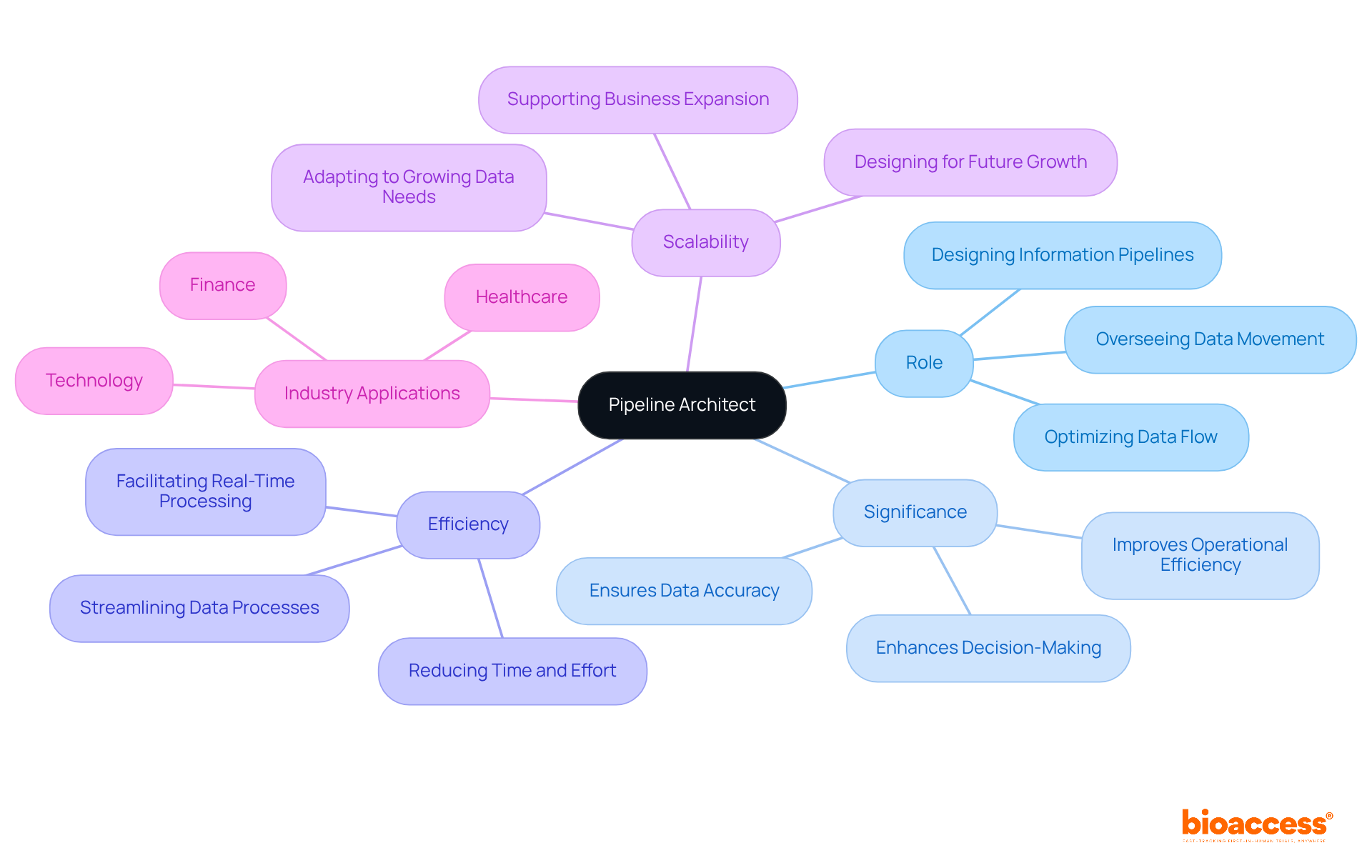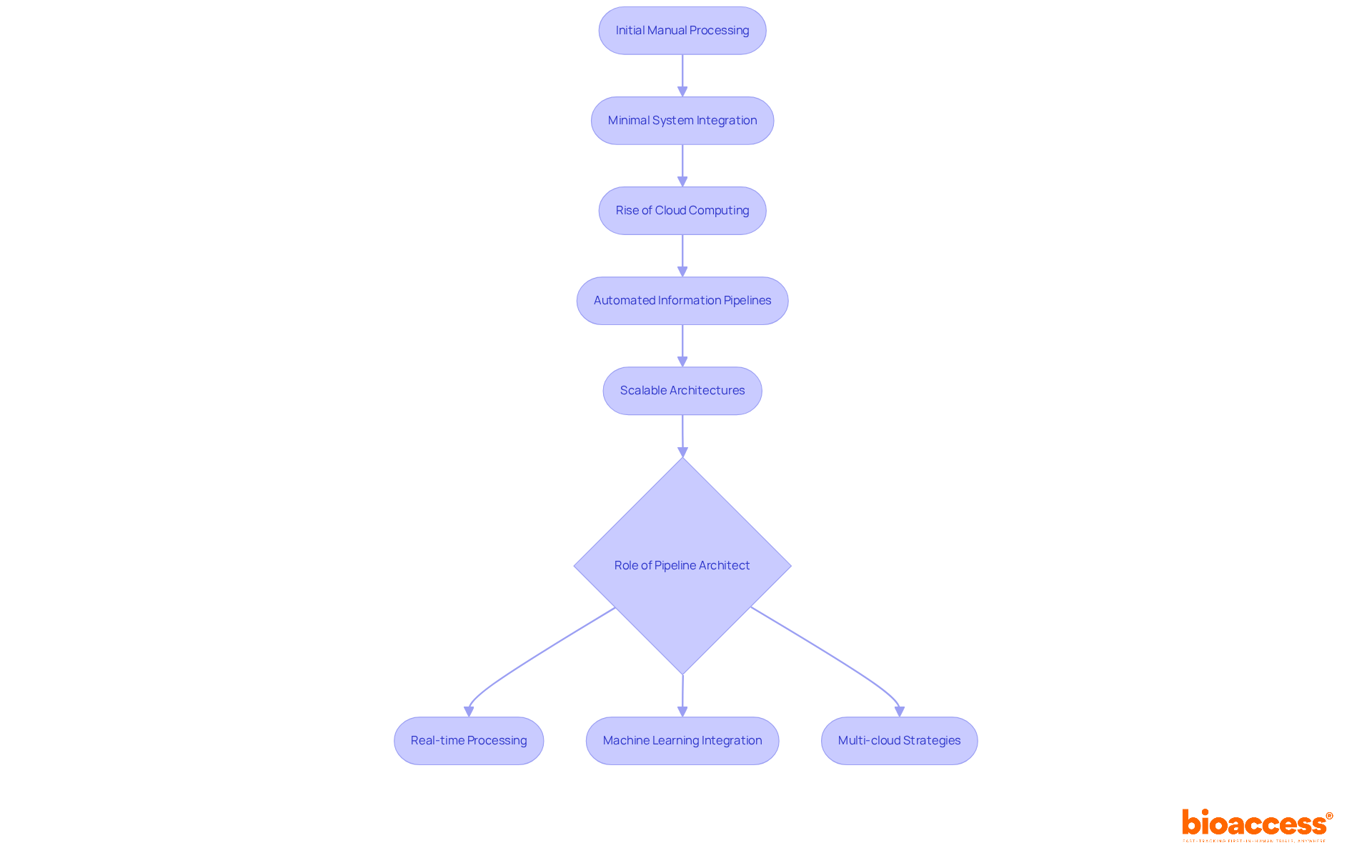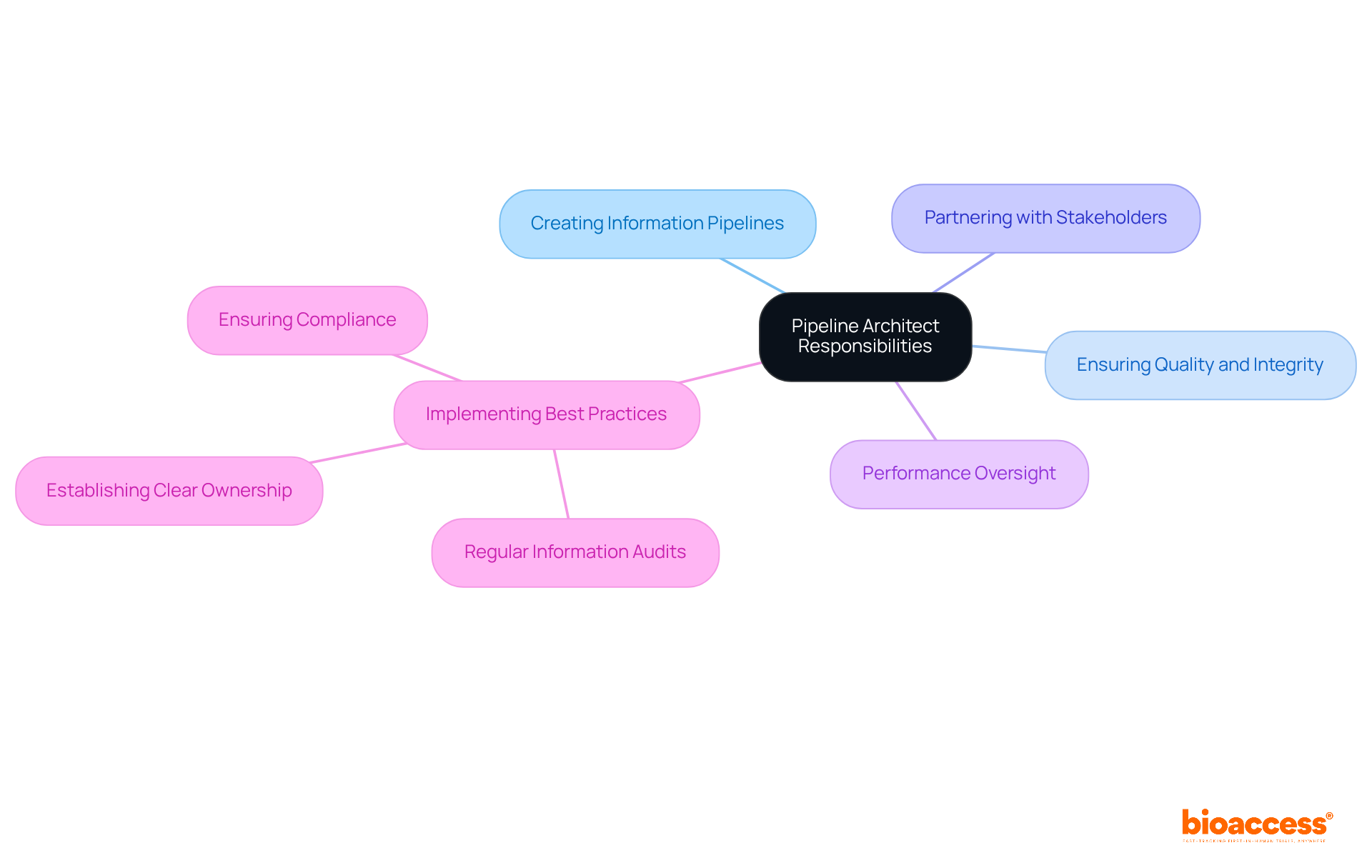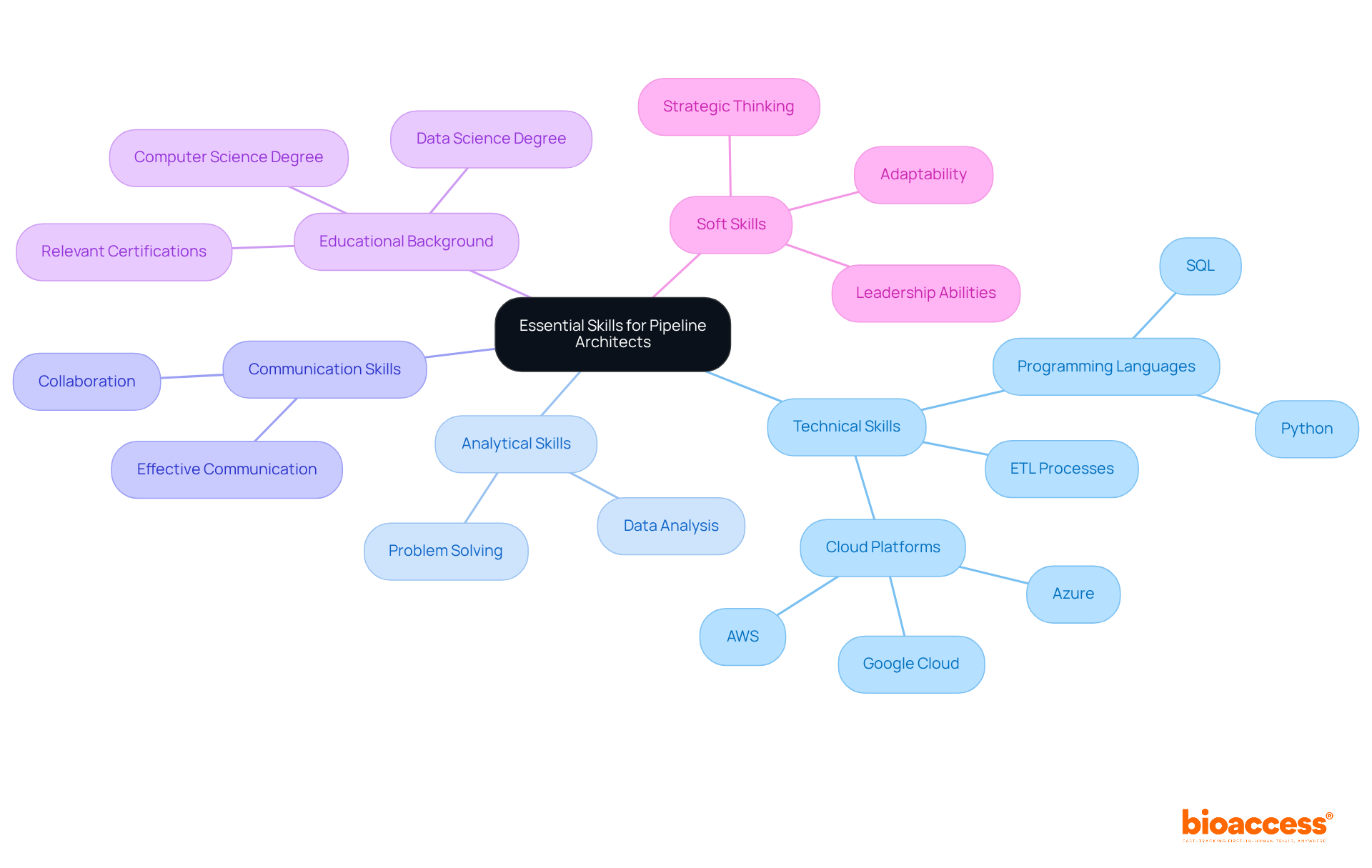


The article articulates that a Pipeline Architect serves as a specialized expert tasked with the design and management of information pipelines, ensuring efficient data flow within systems. This role is essential for enhancing operational efficiency and informed decision-making across diverse industries. It underscores the evolution of this position from manual processes to advanced automated systems. Furthermore, it emphasizes the critical importance of:
to meet the escalating demands of contemporary data architecture.
The role of a pipeline architect has emerged as a cornerstone in the rapidly evolving landscape of data management and software development. This specialized expert is tasked with designing efficient information pipelines that not only enhance operational efficiency but also empower organizations to make data-driven decisions.
As industries increasingly rely on automated systems to process vast amounts of information, it becomes imperative to consider the essential skills and qualifications that pipeline architects must possess to thrive in this complex environment.
Exploring the significance, evolution, and responsibilities of this role reveals the critical impact these professionals have on modern technology and business strategies.
A Flow Architect is a specialized expert responsible for designing and overseeing the movement of information and processes within a system, particularly in the fields of software development and information engineering. This role is crucial, as it ensures that the structure of information pipelines is efficient, scalable, and capable of meeting the demands of modern applications. By optimizing information flow and integration, a pipeline architect enables organizations to leverage data effectively, which in turn enhances decision-making and operational efficiency. Their contributions are vital across various industries, including healthcare, finance, and technology, where data-driven insights are essential.

The evolution of Pipeline Architecture has been profound over the past few decades. Initially defined by manual and linear information processing with minimal system integration, the landscape has shifted dramatically due to technological advancements. The rise of large-scale information and cloud computing has propelled the necessity for automated pipelines, allowing organizations to manage extensive volumes of information effectively. This transformation has resulted in the creation of scalable and flexible architectures that can adjust to the increasing requirements of processing information.
Today, the role of a pipeline architect involves functioning in intricate settings that necessitate expertise in real-time information processing, machine learning integration, and multi-cloud strategies. The adoption of automated information pipelines has surged across various sectors, with statistics from DZone's 2023 Pipelines Trend Report indicating that over 70% of organizations are now utilizing these systems to enhance operational efficiency and decision-making capabilities. In clinical research, for instance, automated information pipelines enhance the collection and analysis of trial information, significantly reducing time to insights and improving patient outcomes. A notable instance is Halodoc, a healthcare application in Indonesia, which utilizes batch pipelines to periodically transfer sensitive user information to their information warehouse, showcasing the practical application of these systems in the healthcare sector.
As the industry continues to evolve, the role of pipeline architects is becoming increasingly critical. As a pipeline architect, they must not only design and implement these sophisticated systems but also ensure they align with organizational goals and regulatory requirements. Moreover, the incorporation of generative AI is revolutionizing information pipelines by improving quality and anomaly detection, which is crucial for upholding the integrity of processing. This dynamic environment highlights the significance of ongoing learning and adaptation in the realm of information architecture, as the role of engineers also evolves to encompass more business and machine learning skills.

The key duties of a Flow Architect encompass the creation of information pipelines that enable the efficient transfer of information between systems, ensuring quality and integrity, and applying best practices for information governance. As Clive Humby aptly stated, 'Information is the new oil,' underscoring the critical value of information management in today's landscape. A pipeline architect is responsible for partnering with scientists, engineers, and stakeholders to comprehend requirements and convert them into technical specifications. They must also oversee and enhance pipeline performance as a pipeline architect, resolve problems, and remain informed about emerging technologies to continuously improve information architecture.
Furthermore, they implement best practices such as:
Their role is crucial in ensuring that information flows seamlessly across various platforms, enabling timely and informed decision-making. As W. Edwards Deming remarked, 'In God we trust, all others bring evidence,' emphasizing the necessity of information quality and integrity in effective decision-making.

Crucial abilities for Design Engineers encompass a solid foundation in information engineering, proficiency in programming languages such as Python and SQL, and expertise in information modeling and ETL (Extract, Transform, Load) processes. Industry insights indicate that proficiency in these programming languages is increasingly sought after in engineering roles, as they facilitate effective manipulation and analysis of information. Furthermore, familiarity with cloud platforms like AWS, Azure, or Google Cloud is essential, as numerous organizations are transitioning to cloud-based solutions for enhanced scalability and flexibility. This shift underscores the necessity for infrastructure designers to understand cloud structures and services that optimize information workflows.
Robust analytical and problem-solving abilities are vital for identifying bottlenecks and improving information flows. Experts emphasize that effective communication and collaboration skills are equally important, enabling pipeline architects to work seamlessly with cross-functional teams and stakeholders, ensuring that information architecture aligns with overarching business objectives. A degree in computer science, data science, or a related field, complemented by relevant certifications, can significantly enhance a candidate's qualifications, positioning them for success in this evolving role. Additionally, soft skills and strategic thinking are crucial for architects to navigate complex challenges and drive innovation in their projects.

The role of a Pipeline Architect is integral to the seamless movement and processing of information within modern systems. As specialists in optimizing data flow, they ensure that organizations can harness the power of information effectively, thereby enhancing decision-making and operational efficiency across various industries. Their expertise is not merely a technical necessity; it is a strategic advantage in today’s data-driven landscape.
Throughout this article, we have explored the evolution of Pipeline Architecture, highlighting its transformation from manual processes to sophisticated automated systems. Key responsibilities of a Pipeline Architect include:
Essential skills such as proficiency in programming languages, knowledge of cloud platforms, and strong analytical abilities are crucial for success in this role. The increased adoption of automated pipelines signifies the growing importance of these professionals in enhancing organizational capabilities.
Reflecting on the significance of Pipeline Architects, it becomes clear that their contributions are vital for organizations aiming to thrive in an increasingly complex technological environment. As industries continue to evolve, the demand for skilled Pipeline Architects will only grow, underscoring the need for ongoing learning and adaptation. Embracing this dynamic role not only fosters innovation but also positions organizations to leverage data as a powerful asset in achieving their goals.
What is the role of a Pipeline Architect?
A Pipeline Architect is a specialized expert responsible for designing and overseeing the movement of information and processes within a system, particularly in software development and information engineering.
Why is the role of a Pipeline Architect significant?
The role is significant because it ensures that the structure of information pipelines is efficient, scalable, and capable of meeting the demands of modern applications, which enhances decision-making and operational efficiency.
How does a Pipeline Architect contribute to an organization?
By optimizing information flow and integration, a Pipeline Architect enables organizations to leverage data effectively, leading to improved decision-making and operational efficiency.
In which industries is the role of a Pipeline Architect vital?
The role is vital across various industries, including healthcare, finance, and technology, where data-driven insights are essential.